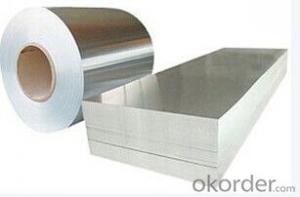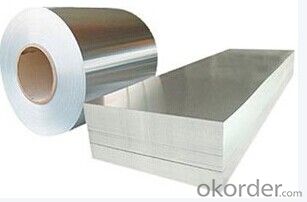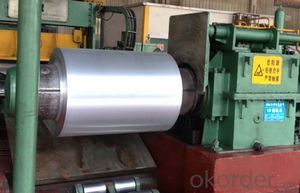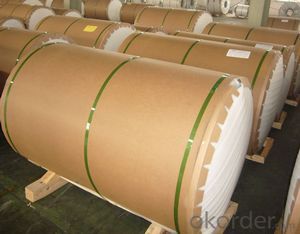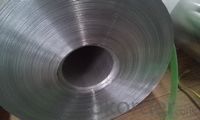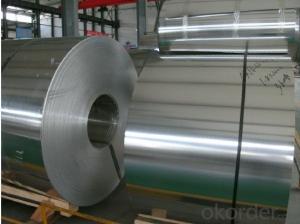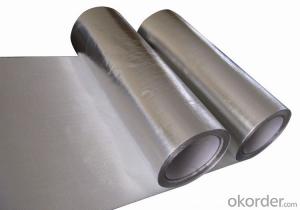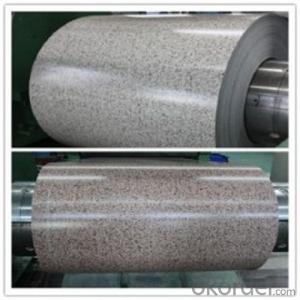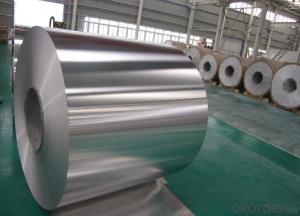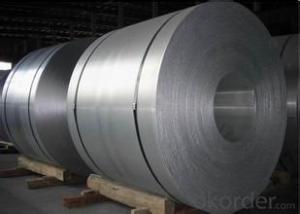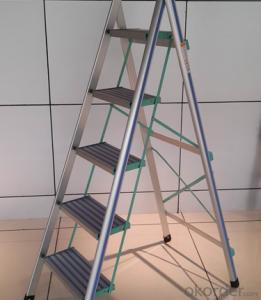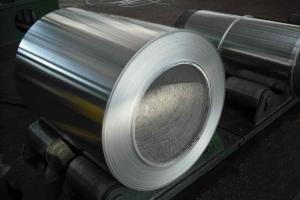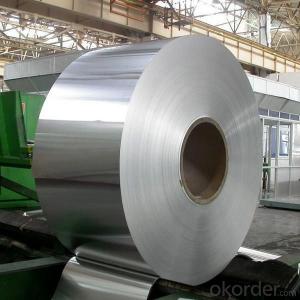AA 1070 aluminium coil
- Loading Port:
- China Main Port
- Payment Terms:
- TT OR LC
- Min Order Qty:
- -
- Supply Capability:
- -
OKorder Service Pledge
Quality Product, Order Online Tracking, Timely Delivery
OKorder Financial Service
Credit Rating, Credit Services, Credit Purchasing
You Might Also Like
supply Mill-finished / coated aluminum plate/sheet/ coil:
Alloy: AA1050,1060,1100,1200,2024,3003,3304,3005,3015,5052,5086,5754,5083,6061,7050,7475,8011, etc
Temper: O, H14/16/18/22/24/32/ H112/H321/T6,T851,T7451,T7351, etc
Thickness: 0.02mm—20mm
Width: 100mm—2000mm (Can be slitted)
Notice: PE coating / PVDF coating / Embossment can be done if required.
- Q: What are environmentally friendly types of aluminum coil and do they exist?
- <p>Yes, there are environmentally friendly types of aluminum coil. These include recycled aluminum coils, which are made from aluminum that has been reprocessed and reused, reducing the need for new aluminum production and its associated environmental impact. Additionally, aluminum coils with a high recycled content are considered eco-friendly as they contribute to waste reduction and energy conservation. The production of recycled aluminum uses significantly less energy compared to virgin aluminum, making it a more sustainable choice.</p>
- Q: Is there a system or initiative in place for recycling aluminum coils?
- <p>Yes, there are recycling programs for aluminum coils. Many recycling centers accept aluminum coils, and some manufacturers have their own recycling programs. Aluminum is highly recyclable, and recycling it saves energy and resources. To recycle aluminum coils, you can contact local recycling facilities or check with the manufacturer for specific programs. Some regions also have e-waste recycling programs that may accept aluminum coils from electronic devices. It's important to clean and prepare the coils for recycling to maximize their value and recyclability.</p>
- Q: Is it safe or practical to utilize aluminum coils in kitchen settings?
- <p>Aluminum coils can be used in the kitchen, but with certain considerations. They are often used in cookware due to their excellent heat conductivity, which allows for even heating. However, there are concerns about aluminum leaching into food, especially at high temperatures or in acidic environments, which could potentially have health implications. It's recommended to use aluminum cookware with a protective coating or to opt for cookware made from other materials like stainless steel or cast iron if there are health concerns. Always check the manufacturer's guidelines for safe usage and cleaning to ensure longevity and safety.</p>
- Q: I was told today that taking aluminium inside your body greatly increases the chance of getting alzheimers as they destroy cells. Is this true?If so, then what foods contain aluminium?Thanks in advance :)
- I hadn't heard of any specific foods, but I have heard that deodorants that have aluminum in them had been linked to Alzheimers.
- Q: What are the potential applications of coil-laminated aluminum coils?
- Coil-laminated aluminum coils have a wide range of potential applications in various industries. They can be used in the manufacturing of automotive parts, such as body panels and interior components, due to their lightweight yet durable nature. Additionally, they are suitable for building and construction purposes, including roofing, siding, and insulation, as they offer excellent corrosion resistance and thermal conductivity. Furthermore, coil-laminated aluminum coils find use in electrical industries for producing transformers, capacitors, and other electrical components due to their excellent electrical conductivity. Overall, their versatility and desirable properties make coil-laminated aluminum coils valuable in numerous applications across different sectors.
- Q: The user is asking if it's possible to use an electric welder for joining aluminum coils.
- <p>Yes, you can use an electric welder to weld aluminum coils together. However, it's important to use the correct type of welder and settings. Gas tungsten arc welding (GTAW), also known as TIG welding, is commonly used for aluminum due to its precision and ability to control heat input. MIG (Metal Inert Gas) welding can also be used for thicker aluminum materials. Ensure you use the right filler material, a suitable welding current, and proper shielding gas to prevent oxidation. Always follow safety precautions and consult with a professional if you're unsure about the welding process.</p>
- Q: Are aluminum coils compatible with other materials?
- Yes, aluminum coils are compatible with various materials, including steel, copper, and other non-ferrous metals. They can be used in conjunction with different materials to enhance their performance and provide various industrial applications.
- Q: What are the common problems faced with aluminum coils?
- There are several common problems that can be faced with aluminum coils. One of the most common issues is corrosion. Aluminum coils are susceptible to corrosion, especially when they are exposed to moisture. This can lead to the formation of rust or other types of corrosion, which can weaken the coil and affect its performance. Another common problem is coil damage. Aluminum coils can be easily damaged during handling or transportation. This can result in bent or dented coils, which can impact their efficiency and lifespan. In severe cases, the coil may even develop leaks or cracks, causing refrigerant or coolant to leak out. Clogging is another issue that can occur with aluminum coils. Over time, dust, dirt, and debris can accumulate on the coil, obstructing the airflow and reducing the coil's efficiency. This can result in poor cooling or heating performance, higher energy consumption, and increased wear and tear on the system. Additionally, aluminum coils can suffer from coil leaks. These leaks can occur due to a variety of reasons, such as physical damage, corrosion, or manufacturing defects. When a coil develops a leak, it can lead to refrigerant or coolant leakage, which can affect the overall performance of the HVAC system. Lastly, improper installation or maintenance practices can also cause problems with aluminum coils. If the coil is not installed correctly or if regular maintenance is neglected, it can lead to issues such as poor airflow, inefficient cooling or heating, and increased energy consumption. In order to avoid these common problems, it is important to properly maintain aluminum coils by regularly cleaning them, inspecting for any signs of damage or corrosion, and ensuring proper installation and handling. Regular maintenance and timely repairs can help minimize the occurrence of these problems and ensure the longevity and efficiency of the aluminum coils.
- Q: What are the weight considerations when using aluminum coils?
- When incorporating aluminum coils, there are various factors to consider regarding weight. To begin with, aluminum coils generally possess a lighter weight in comparison to other metals, such as steel. This characteristic makes them a favored choice in industries prioritizing weight reduction, like automotive manufacturing or aerospace applications. The lightweight nature of aluminum coils leads to enhanced fuel efficiency in vehicles and increased payload capacity in airplanes. Furthermore, it is important to take into account the weight of the aluminum coil itself. Depending on the specific usage, the coil's weight may need to fall within certain limits to ensure proper functionality and structural integrity. For instance, in HVAC systems, the weight of the aluminum coil must be appropriate for secure mounting and capable of withstanding vibrations or pressure changes. Moreover, the weight of the aluminum coil can impact transportation and installation. Lighter coils are simpler to handle, transport, and install, thereby reducing the time and effort required for these processes. This advantage can be particularly valuable in construction projects that involve a large quantity of aluminum coils. Additionally, it is crucial to consider the weight-bearing capacity of the structures or equipment that will support or utilize the aluminum coils. The combined weight of the coils, along with any additional components or materials, should not exceed the load capacity of the system to prevent structural failure or safety hazards. Lastly, the weight of aluminum coils can influence cost considerations. Since the price of aluminum is typically based on weight, lighter coils may prove to be more cost-effective when compared to heavier alternatives. However, it is important to strike a balance between weight reduction and meeting the required performance and strength specifications. In conclusion, weight considerations when using aluminum coils encompass various factors, including the overall benefits of weight reduction, the weight of the coil itself, ease of transportation and installation, load-bearing capacity, and cost implications. Taking these considerations into account ensures the successful and efficient utilization of aluminum coils in diverse industries and applications.
- Q: What is the role of aluminum coils in the construction of railways?
- Aluminum coils play a critical role in the construction of railways. They are commonly used in the manufacturing of railway tracks and train cars due to their unique properties and advantages. One of the main roles of aluminum coils in railway construction is their contribution to lightweighting. Aluminum is a lightweight material, making it ideal for reducing the overall weight of railway components. This is important because lighter trains and tracks require less energy to operate, resulting in improved fuel efficiency and reduced operating costs. Additionally, the reduced weight of aluminum components allows for increased payload capacity, enabling trains to carry more passengers or freight. Another crucial role of aluminum coils is corrosion resistance. Railways are subjected to various environmental conditions, including moisture, salt, and extreme temperatures. Aluminum has excellent corrosion resistance properties, making it highly durable and long-lasting even in harsh environments. This reduces maintenance and replacement costs associated with rust and corrosion, ensuring the longevity and reliability of the railway infrastructure. Moreover, aluminum coils offer excellent conductivity, which is essential for electrical and signaling systems in railways. Aluminum's high electrical conductivity allows for efficient power transmission and distribution, enabling seamless communication between trains, signaling devices, and control systems. This contributes to the safety and efficiency of railway operations. Furthermore, aluminum coils can be easily formed and fabricated into various shapes, enabling flexibility in railway design and construction. This versatility allows for the production of customized railway components, such as curved tracks or aerodynamic train carriages, to meet specific project requirements. In summary, the role of aluminum coils in the construction of railways is vital due to their lightweight, corrosion-resistant, conductive, and versatile nature. Their use in railway infrastructure results in numerous benefits, including improved fuel efficiency, reduced maintenance costs, enhanced safety, and the ability to design and construct innovative railway systems.
Send your message to us
AA 1070 aluminium coil
- Loading Port:
- China Main Port
- Payment Terms:
- TT OR LC
- Min Order Qty:
- -
- Supply Capability:
- -
OKorder Service Pledge
Quality Product, Order Online Tracking, Timely Delivery
OKorder Financial Service
Credit Rating, Credit Services, Credit Purchasing
Similar products
Hot products
Hot Searches
Related keywords

